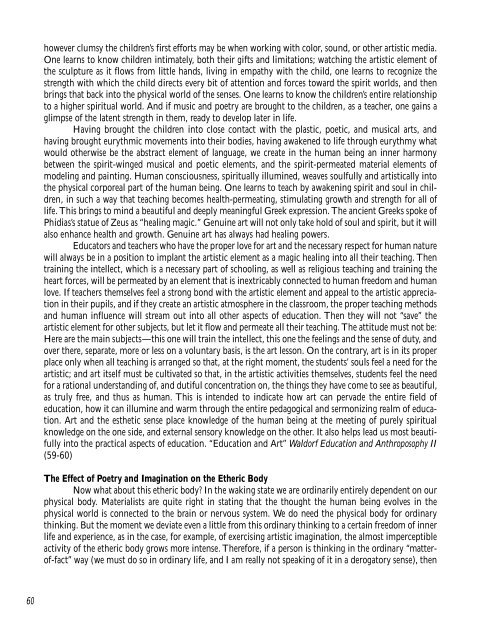Colloquium on English - Research Institute for Waldorf Education
Colloquium on English - Research Institute for Waldorf Education
Colloquium on English - Research Institute for Waldorf Education
Create successful ePaper yourself
Turn your PDF publications into a flip-book with our unique Google optimized e-Paper software.
60<br />
however clumsy the children’s first ef<strong>for</strong>ts may be when working with color, sound, or other artistic media.<br />
One learns to know children intimately, both their gifts and limitati<strong>on</strong>s; watching the artistic element of<br />
the sculpture as it flows from little hands, living in empathy with the child, <strong>on</strong>e learns to recognize the<br />
strength with which the child directs every bit of attenti<strong>on</strong> and <strong>for</strong>ces toward the spirit worlds, and then<br />
brings that back into the physical world of the senses. One learns to know the children’s entire relati<strong>on</strong>ship<br />
to a higher spiritual world. And if music and poetry are brought to the children, as a teacher, <strong>on</strong>e gains a<br />
glimpse of the latent strength in them, ready to develop later in life.<br />
Having brought the children into close c<strong>on</strong>tact with the plastic, poetic, and musical arts, and<br />
having brought eurythmic movements into their bodies, having awakened to life through eurythmy what<br />
would otherwise be the abstract element of language, we create in the human being an inner harm<strong>on</strong>y<br />
between the spirit-winged musical and poetic elements, and the spirit-permeated material elements of<br />
modeling and painting. Human c<strong>on</strong>sciousness, spiritually illumined, weaves soulfully and artistically into<br />
the physical corporeal part of the human being. One learns to teach by awakening spirit and soul in children,<br />
in such a way that teaching becomes health-permeating, stimulating growth and strength <strong>for</strong> all of<br />
life. This brings to mind a beautiful and deeply meaningful Greek expressi<strong>on</strong>. The ancient Greeks spoke of<br />
Phidias’s statue of Zeus as “healing magic.” Genuine art will not <strong>on</strong>ly take hold of soul and spirit, but it will<br />
also enhance health and growth. Genuine art has always had healing powers.<br />
Educators and teachers who have the proper love <strong>for</strong> art and the necessary respect <strong>for</strong> human nature<br />
will always be in a positi<strong>on</strong> to implant the artistic element as a magic healing into all their teaching. Then<br />
training the intellect, which is a necessary part of schooling, as well as religious teaching and training the<br />
heart <strong>for</strong>ces, will be permeated by an element that is inextricably c<strong>on</strong>nected to human freedom and human<br />
love. If teachers themselves feel a str<strong>on</strong>g b<strong>on</strong>d with the artistic element and appeal to the artistic appreciati<strong>on</strong><br />
in their pupils, and if they create an artistic atmosphere in the classroom, the proper teaching methods<br />
and human influence will stream out into all other aspects of educati<strong>on</strong>. Then they will not “save” the<br />
artistic element <strong>for</strong> other subjects, but let it flow and permeate all their teaching. The attitude must not be:<br />
Here are the main subjects—this <strong>on</strong>e will train the intellect, this <strong>on</strong>e the feelings and the sense of duty, and<br />
over there, separate, more or less <strong>on</strong> a voluntary basis, is the art less<strong>on</strong>. On the c<strong>on</strong>trary, art is in its proper<br />
place <strong>on</strong>ly when all teaching is arranged so that, at the right moment, the students’ souls feel a need <strong>for</strong> the<br />
artistic; and art itself must be cultivated so that, in the artistic activities themselves, students feel the need<br />
<strong>for</strong> a rati<strong>on</strong>al understanding of, and dutiful c<strong>on</strong>centrati<strong>on</strong> <strong>on</strong>, the things they have come to see as beautiful,<br />
as truly free, and thus as human. This is intended to indicate how art can pervade the entire field of<br />
educati<strong>on</strong>, how it can illumine and warm through the entire pedagogical and serm<strong>on</strong>izing realm of educati<strong>on</strong>.<br />
Art and the esthetic sense place knowledge of the human being at the meeting of purely spiritual<br />
knowledge <strong>on</strong> the <strong>on</strong>e side, and external sensory knowledge <strong>on</strong> the other. It also helps lead us most beautifully<br />
into the practical aspects of educati<strong>on</strong>. “Educati<strong>on</strong> and Art” <strong>Waldorf</strong> Educati<strong>on</strong> and Anthroposophy II<br />
(59-60)<br />
The Effect of Poetry and Imaginati<strong>on</strong> <strong>on</strong> the Etheric Body<br />
Now what about this etheric body? In the waking state we are ordinarily entirely dependent <strong>on</strong> our<br />
physical body. Materialists are quite right in stating that the thought the human being evolves in the<br />
physical world is c<strong>on</strong>nected to the brain or nervous system. We do need the physical body <strong>for</strong> ordinary<br />
thinking. But the moment we deviate even a little from this ordinary thinking to a certain freedom of inner<br />
life and experience, as in the case, <strong>for</strong> example, of exercising artistic imaginati<strong>on</strong>, the almost imperceptible<br />
activity of the etheric body grows more intense. There<strong>for</strong>e, if a pers<strong>on</strong> is thinking in the ordinary “matterof-fact”<br />
way (we must do so in ordinary life, and I am really not speaking of it in a derogatory sense), then

















